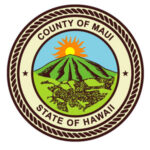Jun 17, 2020 | Community
Like other communities across the country, Maui County and its residents have been affected by the anger, grief and hurt caused by recent events in Minneapolis, Georgia, Louisville and elsewhere, and the resulting civil unrest. ‘The knee on the neck” is an apt metaphor for the anguish and fear that learned hatred and bigotry – sometimes casual, sometimes coded – cause for so many of our fellow citizens.
MEDB joins in condemning the systemic racism evidenced by these events. We stand with those raising their voices, protesting injustices, and demanding constructive change. We cannot achieve social justice when members of our communities are oppressed on the basis of race, gender, or ethnicity.
MEDB is committed to inclusivity, diversity, and the power of education and community engagement, especially for the underrepresented and those who feel disenfranchised. We work towards tackling the inequities that exist in so many aspects of our society.
We see hope for the future in our young people especially, who have articulated their dissatisfaction, here as elsewhere, with the status quo on issues ranging from oppression and social injustice to climate change.
We are truly blessed to live in a place of rich culture, natural beauty and abundance, but we must all acknowledge the importance of inclusion and equity of access for shared prosperity while recognizing our own particular history of past injustice and cultural oppression.
John Harrisson, Program Director, MEDB, and father of two African-American young men
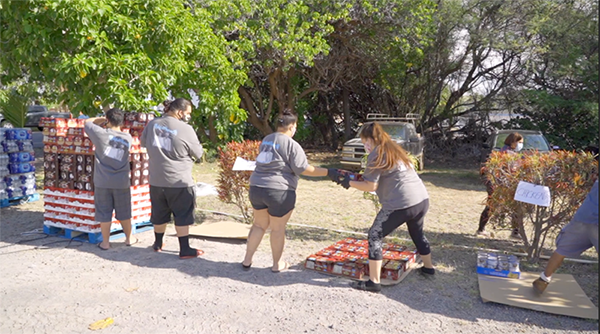
Jun 3, 2020 | Community, Small Business, Sustainability
More than 33,000 pounds of food are being distributed by the Maui Food Bank to Moloka‘i residents in need through a $20,000 contribution from the Hawaiian Electric Industries Charitable Foundation (HEICF). HEI is the parent company of Hawaiian Electric, which supplies power to Maui, Moloka‘i, Lāna‘i, O‘ahu and Hawai‘i Island. In March, the HEICF contributed $50,000 to the Hawai‘i Food Bank and pledged another $75,000 to United Way agencies in support of their efforts to assist families in need across the state during the COVID-19 pandemic. The current donation provides additional shipments to supplement Maui Food Bank’s regular monthly delivery of food to Moloka‘i. Once delivered, 19 partner agencies across the island distribute nutritious fresh food to individuals, families, children, and seniors on fixed incomes, those without shelter—anyone who is at risk of going hungry.

“During this coronavirus pandemic with many more in our communities facing hardships, the Maui Food Bank is experiencing a significant increase in requests for food assistance,” said Richard Yust, Executive Director of the Maui Food Bank. “This generous contribution from Hawaiian Electric enables much needed additional pallets of food to be shipped to Moloka‘i where food distributions are being depleted.”
Sharon Suzuki, President of Maui County and Hawai’i Island Utilities for Hawaiian Electric said, “We are grateful for organizations like the Maui Food Bank and the on-island partner agencies for maintaining this critical service throughout these uncertain times. We are all in this together and we want to help alleviate this escalating need for basic necessities in one of the most remote communities we serve.”
“ʻAʻohe hana nui ke alu ʻia! No task is too large when we come together,” said Kilia Purdy-Avelino of Alu Like, Inc., a partner agency on Moloka‘i. “Mahalo to all for working together in unity to aloha Moloka‘i with such generous donations from the Maui Food Bank, Hawaiian Electric and other companies, non-profit organizations, and even individuals. The overwhelming gratitude from the receiving families speaks volumes of what the extra Food Bank deliveries mean to our community.”
We are grateful to all the volunteers and donors helping to distribute food throughout the island to those in need.
Sharon Suzuki, President, Maui County and Hawai’i Island Utilities
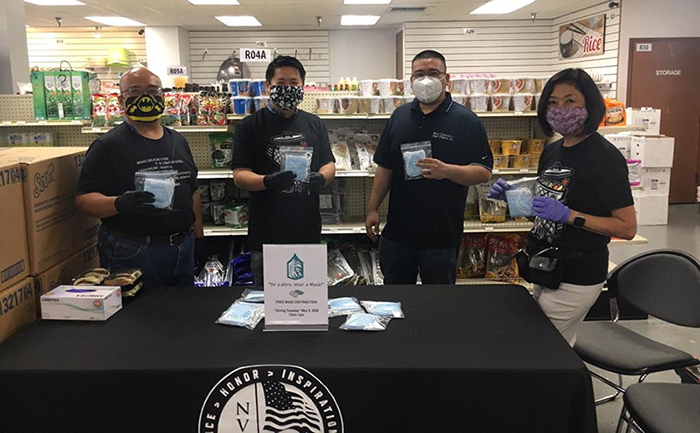
May 27, 2020 | Community
Volunteers with the Nisei Veterans Memorial Center (NVMC) and Maui United Way handed out 8,000 face masks during their GivingTuesday “Be a Hero, Wear a Mask” campaign. GivingTuesday, a global generosity movement, launched GivingTuesdayNow in response to the COVID-19 pandemic. “I appreciate the effort to prevent the spread of COVID-19 in our community,” said Mayor Michael Victorino. “Our success in leveling the curve comes from members of our community working together to keep each other healthy, especially our vulnerable kupuna. Mahalo to the NVMC and Maui United Way for helping to keep Maui strong.”

The masks are part of Every1neHawaii’s Masks4All campaign. The Honolulu nonprofit successfully brought in 2 million masks, disbursing them to all islands across the State. The goal was to make the face masks available at no charge to those most in need. Free face mask distribution sites included TJs Grocery Outlet, Island Grocery Depot (Kahului and Lahaina) and Pukalani Superette. Mask giveaways were also donated to Hale Makua and Valley Isle Federal Credit Union. Giveaway volunteers included Mayor Victorino, professional surfers Kai Lenny and Ian Walsh, and members of the Maui delegation from the Hawaii State Legislature.
“This was indeed a community effort, and we are thankful to Every1neHawaii for the masks and for the support we received from all of our partners to ensure the masks got to the community,” said Deidre Tegarden, Executive Director of the Nisei Veterans Memorial Center. “We initially received 160,000 masks, which we were able to distribute through Maui United Way and other local nonprofit partners. We could not have distributed the masks so quickly if it were not for the amazing team at Maui United Way, who continually work to address Maui’s most vital needs through the impact areas of education, economic sustainability, and health.”
Tegarden added, “The NVMC, whose mission is to ignite human potential by inspiring people to find the hero in themselves, and Maui United Way joined as partners to address the pandemic and inspire people to give, advocate, and volunteer. Stay well. Follow the standard tips for safety. We will get through this together!”
The goal of NVMC and Maui United Way is to bring our community together around a common cause, such as aiding those in need during this pandemic.
Deidre Tegarden, NVMC Executive Director
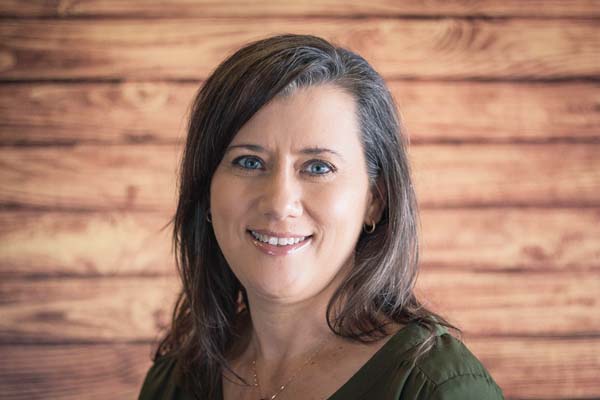
May 20, 2020 | Community
 Monique Yamashita, Executive Director of Ka Hale A Ke Ola (KHAKO) Homeless Resource Centers, Inc., has over 15 years of social service experience in Maui County. Currently, as executive director of two homeless shelters, one in Wailuku and one in Lahaina, she has developed emergency COVID-19 protocols to ensure the safety of the clients and staff. “We are committed to doing what is best to protect our guests, tenants, staff, and vendors, and to do our part to prevent the transmission of the virus,” Yamashita said. “The County of Maui recently delivered tests for us to administer to provide reassurance of wellness in both of our facilities. In addition, we are so thankful for amazing friends in our community who have blessed us with handmade and disposable face masks and shields.”
Monique Yamashita, Executive Director of Ka Hale A Ke Ola (KHAKO) Homeless Resource Centers, Inc., has over 15 years of social service experience in Maui County. Currently, as executive director of two homeless shelters, one in Wailuku and one in Lahaina, she has developed emergency COVID-19 protocols to ensure the safety of the clients and staff. “We are committed to doing what is best to protect our guests, tenants, staff, and vendors, and to do our part to prevent the transmission of the virus,” Yamashita said. “The County of Maui recently delivered tests for us to administer to provide reassurance of wellness in both of our facilities. In addition, we are so thankful for amazing friends in our community who have blessed us with handmade and disposable face masks and shields.”
Dedicated to serving the needs of the homeless and hungry on Maui, KHAKO has been providing emergency food and housing for over 30 years. They empower those in need to take responsibility for their own lives and they call on the community to assist in these actions. Yamashita reflected, “We are truly blessed with great community partners. Our approach goes beyond providing basic shelter and sustenance for homeless persons. Through a series of structured programs and services, we focus on instilling the skills, knowledge and experience necessary to support self-sufficiency and promote positive, healthy life choices.”
With all of the COVID-19 concerns, KHAKO is still in operation, bringing in new families and individuals who are experiencing homelessness as well as working with current clients to assist them with obtaining permanent housing. “While the world may be at a standstill, life carries on at our shelters and we are still working to end the cycle of homelessness,” said Yamashita. “On any given day, the KHAKO staff works to create stability in lives and to ensure success in permanent housing. There is already a lot of pressure for the clients, and COVID-19 is not making things easier, but we will continue to assist those in need.”
I do this work because everyone deserves a dignified and healthy quality of life. Poverty is cruel and no one should be without a home because of it.
Monique Yamashita, Executive Director, KHAKO Homeless Resource Centers, Inc.
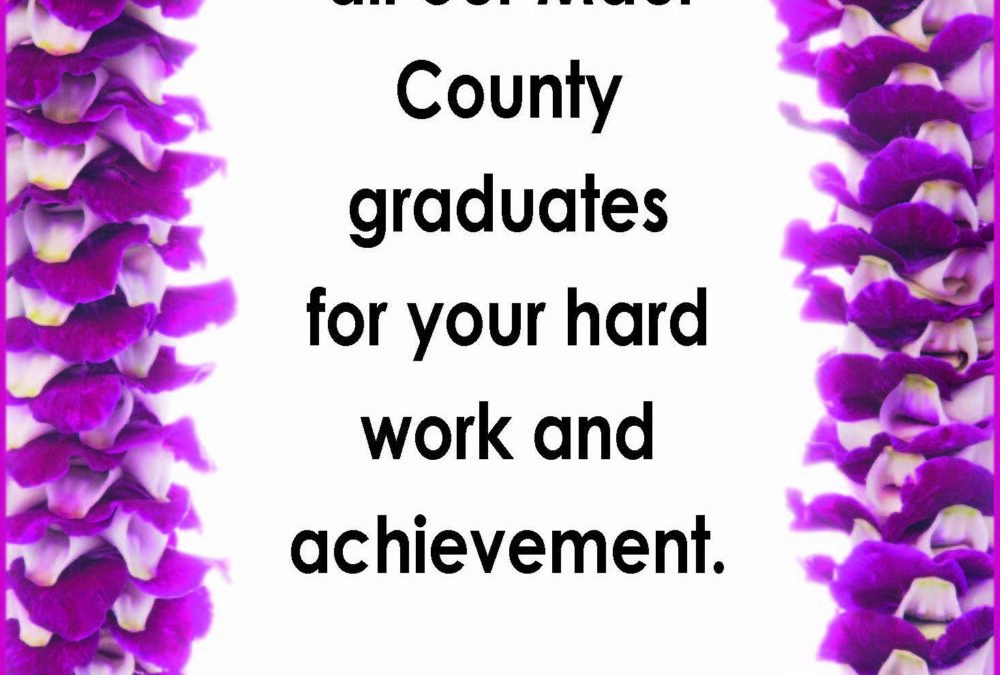
May 13, 2020 | Community, Education
As we enter graduation season, MEDB congratulates and commends all our Maui County graduates for your hard work and achievement.
We wish you a bright and prosperous future!
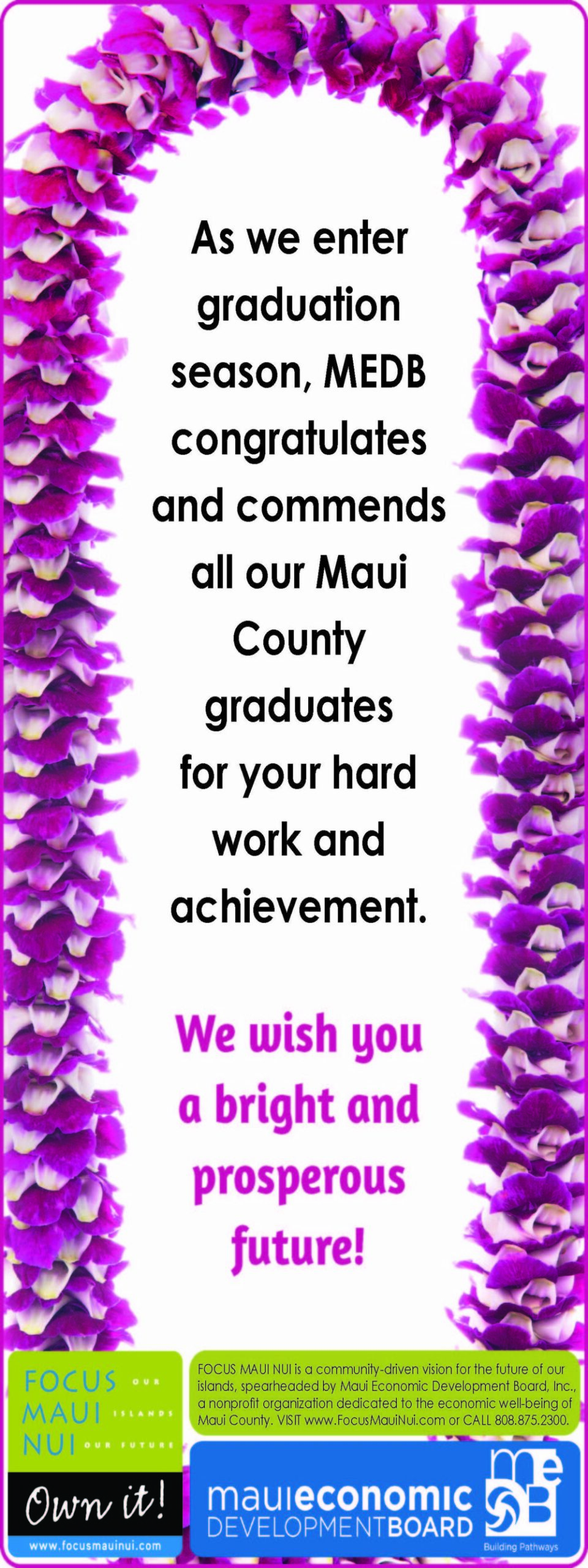
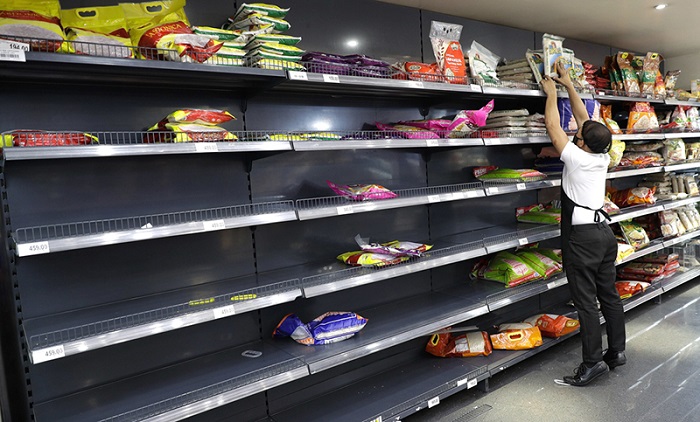
May 6, 2020 | Community
The essential community workers that we see every day have become our lifelines throughout the COVID-19 pandemic. They are our heroes. Possibly those working in supermarkets and other large retail corporations are the only other people we might talk to in person all day or all week. Their jobs have grown to include smiling while politely assisting and defraying the island’s tensions. Now among the island’s most crucial personnel, retail workers as well as other everyday essential workers, are exposed to new dangers. For example, cleaning of stores and check-out stands has ramped up. Store hours have changed to protect workers and customers, including additional hours for seniors to shop, increased closure hours for deep cleaning each night, and more.

Photo Credit: AP Photo/Aaron Favila
One supermarket store manager said, “In emergencies like this, we hear a lot about the first responders and those on the front lines. That’s important, and in this case doctors, nurses, firefighters, and everyone else working in that realm of healthcare deserve much honor. But what about the people working in the supermarkets, restaurants, and elsewhere — those handling the pandemonium — with our mad dash for most everything on the shelves?”
Upcountry resident Taryn Feliciano agreed, “From the cashiers, to the meat and fish department workers, and those stocking the shelves, they are all brave souls along with anybody else working in the public while most people stay at home. From replenishing supplies to answering questions, the calm that they exhibit every day in the supermarkets and other open establishments is reflected in the island shoppers, who on the whole remain pretty neighborly.”
Grocery workers, in particular, have also become the front- line during the health crisis─ interacting with potentially hundreds of people every day. They are risking infection every time they come within a few feet of a customer. Of all essential employees, along with the medical profession, the ones who bag groceries at the store, handle cash, give directions to needed products, and restock shelves all day long, are the ones with the most contact. These positions now assume increased risk for these service providers. Still, they remain steadfastly committed to the vital service they are providing to each of us.
Thanks to all those in our community who are continuously providing help and services to everyone.
MEDB Staff
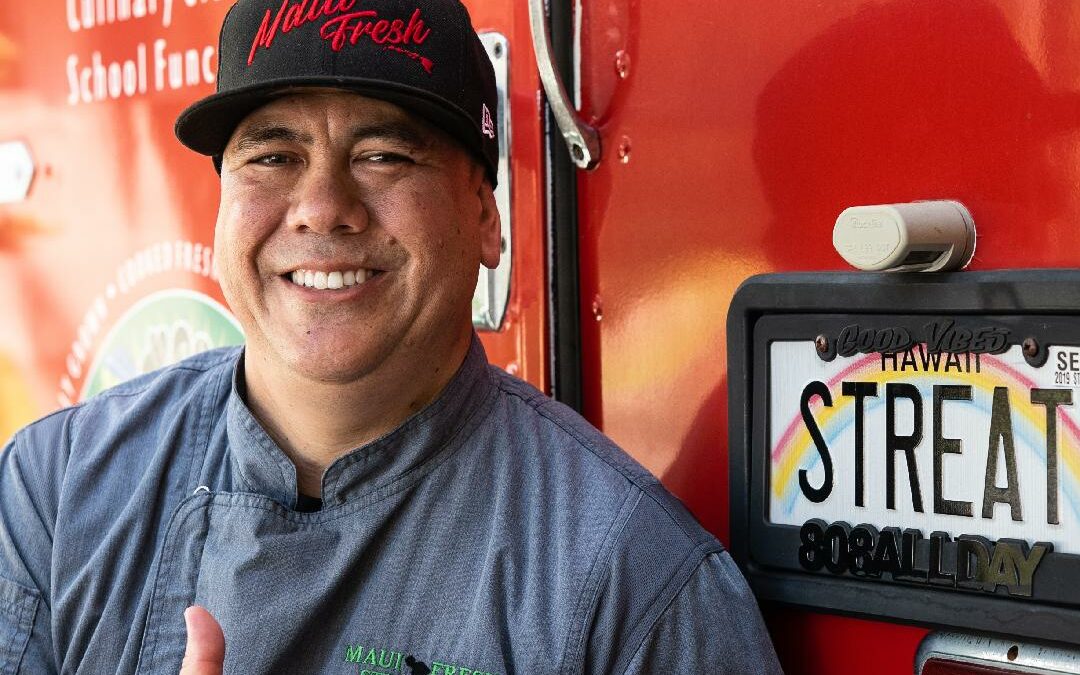
Apr 8, 2020 | Community
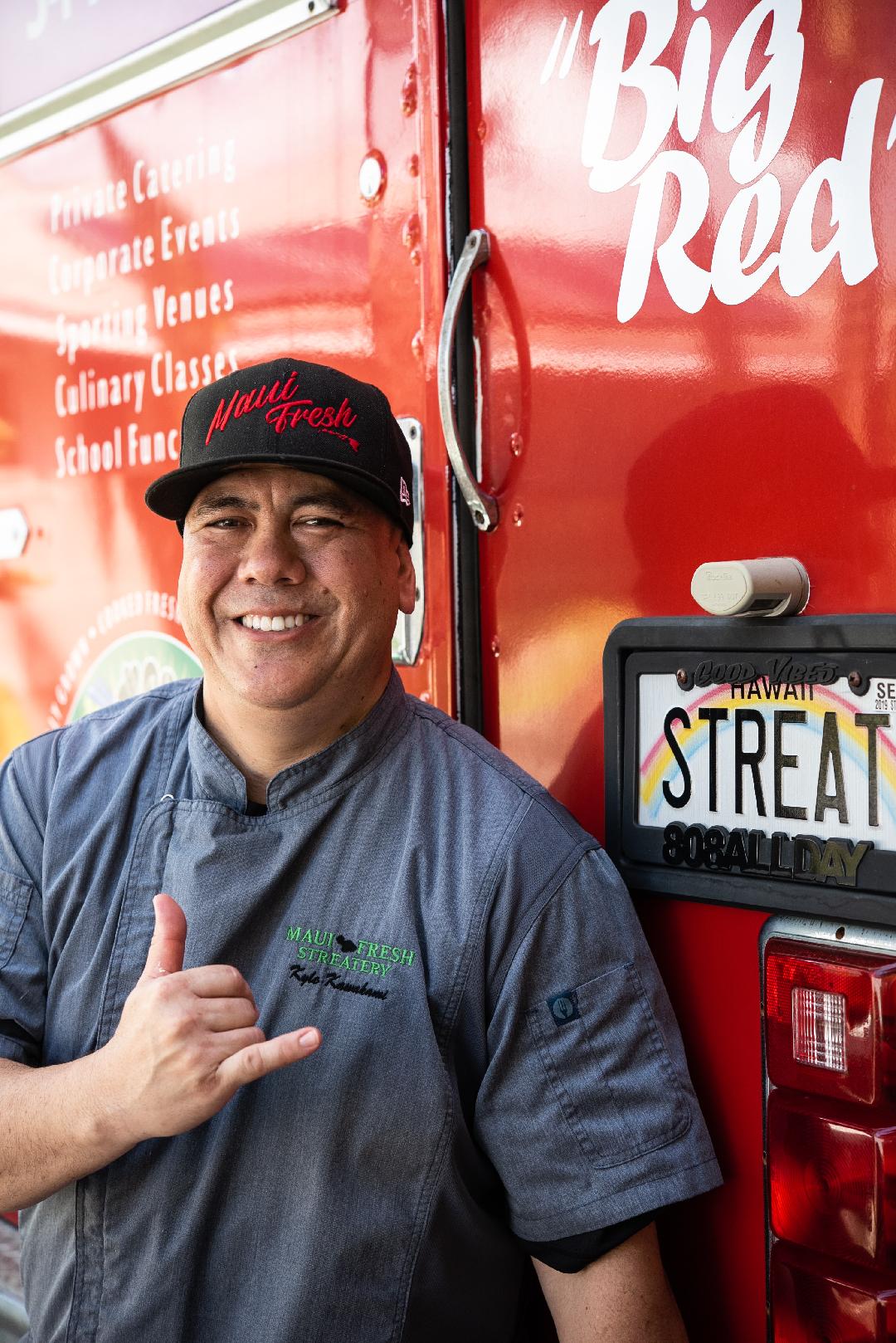 Kyle Kawakami, Maui-born 2019 Chef of the Year, is continuously thinking of ways to help his Maui community. His philanthropy is endless. He is well known for placing an Aloha tip jar on the counter of his Maui Fresh Streatery Food Truck to help raise funds for those in need. Whether it is individuals or nonprofits, his gifts have totaled over $50,000. “The Pay it Forward program translates as Aloha Spirit,” Kawakami said. “We as a community need to come together during these times to support each other. Without compassion and caring for our kupuna, our neighbors, our friends, and our ohana we have nothing. It is what separates us from the rest of the world─ what makes us Hawaii.”
Kyle Kawakami, Maui-born 2019 Chef of the Year, is continuously thinking of ways to help his Maui community. His philanthropy is endless. He is well known for placing an Aloha tip jar on the counter of his Maui Fresh Streatery Food Truck to help raise funds for those in need. Whether it is individuals or nonprofits, his gifts have totaled over $50,000. “The Pay it Forward program translates as Aloha Spirit,” Kawakami said. “We as a community need to come together during these times to support each other. Without compassion and caring for our kupuna, our neighbors, our friends, and our ohana we have nothing. It is what separates us from the rest of the world─ what makes us Hawaii.”
Kawakami is assisting the community in numerous ways. “First, we are using our location as a food hub to help local farmers and fish purveyors sell their harvests that are currently not moving,” he said. “Our first food hub was with Okoa Farms. They dropped off 20 boxes filled with a farmer’s choice of produce, which we sold for them, giving 100 percent of the proceeds back to the farm.”
Another community assistance program Kawakami implemented is Kokua Meals. Customers are able to make donations to purchase meals for families in need, children that normally receive free or subsidized lunches, socially isolated seniors, and others. “Today,” he said, “we had volunteers deliver 45 meals to those in the community, along with other donated food products such as fresh bread and sausage.”
Additionally, Kawakami changed his Maui Fresh Streatery service to address the current pandemic situation that we are in. “At this time, we have implemented a Zero Contact Service,” he explained. “Meals are cooked, packaged, and labeled. The zero contact comes upon pickup. Customers remain in their cars. When it is their turn to order we give an alcohol wipe to sanitize their hands and take payment. The food is placed on a table near the car for the customer to claim. Then, we sanitize the table for the next order. We will get through this together!”
Our Aloha tip jar is currently being used to assist with the Kokua Meals through our Pay it Forward program. You can’t shut down Aloha!
Kyle Kawakami, Maui Fresh Streatery Food Truck, Chef/Owner
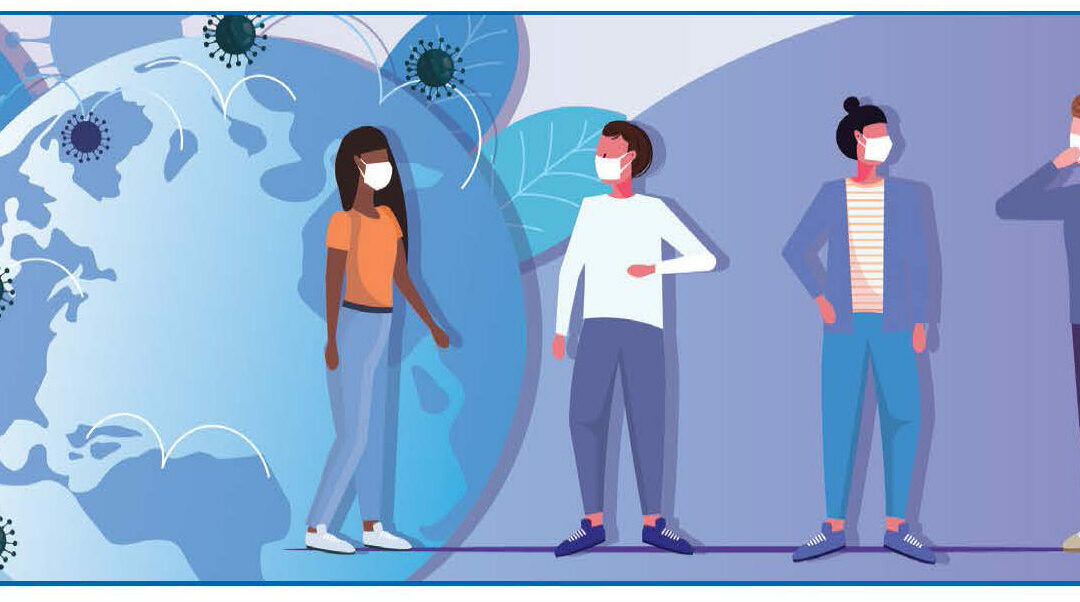
Apr 1, 2020 | Community
All of us at MEDB wish good health to everyone in our community in these difficult times. We would like to reinforce the new rules announced by the Mayor to keep residents safe and healthy during the fight against the spread of COVID-19, starting with staying at home and working from home except for essential activities and business, or government operations. Travel likewise should be minimized. We should all avoid any private or public gatherings outside the home, and wherever you are, be sure to wash your hands thoroughly and often.
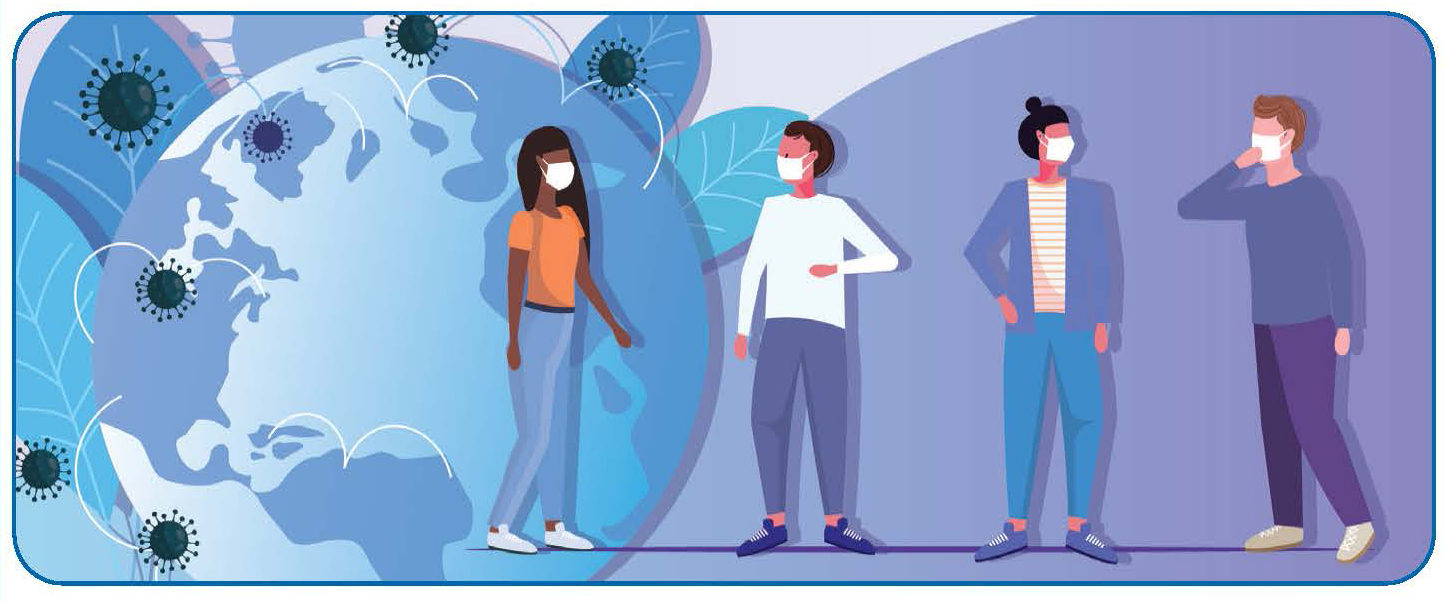
Announcing the restrictions effective March 25th, Mayor Victorino announced, “Decisive action is needed to stem the spread of COVID-19 and protect our healthcare resources, our hospital beds, respirators and the health and safety of doctors, nurses and other healthcare professionals. I humbly ask all of us to do our part to flatten the curve and come together as a community.”
Essential activities during this period include those essential to maintain health and safety (such as visiting a doctor or getting medicine), getting food or pet food and necessary home supplies, caring for a family member in another household or caring for the elderly, minors, dependents, those with disabilities or other vulnerable persons, performing essential business or government work, or taking part in solitary outdoor exercise (running, walking, hiking).
For more information, and for a list of government services and businesses that may remain open during this time, visit the County of Maui’s website at mauicounty.gov.
While the current restrictions are in place, MEDB will use this weekly space to keep our community updated in the coming weeks and highlight some of the positive and welcome initiatives that are taking place in our community as we pull together to meet the challenges facing all of us.
For more information, and for a list of government services and businesses that may remain open during this time, visit the County of Maui’s website at mauicounty.gov.
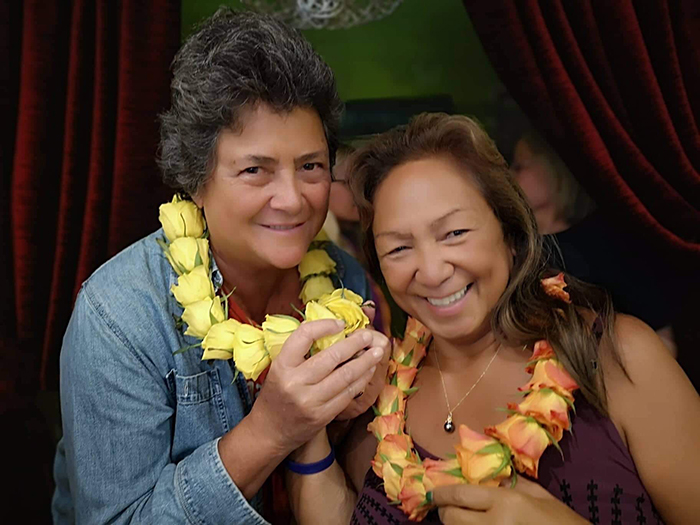
Mar 25, 2020 | Community
As we celebrate Women in History month across the nation, we are truly blessed that Lei’ohu Ryder continues to bring the spirit of aloha to Maui and to the world. A beacon of light in the community, Ryder’s music and albums have touched the hearts of locals and visitors alike. Her kuleana (responsibility), leadership, and honor for all beings is her global calling, and her talents and wisdom are loved everywhere she goes. She has received the Peace Educator Award from the United Nations, the Women of Honor Award from Women’s History Month, the Educator Award from the Peace Corps, and the Malama Ka’Aina Award from the Sierra Club.

“Aloha is everything!,” Ryder explained. “It is about living in the moment, grounding my heart in service, and helping wherever I can. I received my awards because I am passionate about peace. I designed a peace curriculum when I taught at ‘Iao Intermediate School, and recorded music with children based on DOE goals, all around harmony and tranquility. It was through being a peace advocate, blind to ideologies that separate us from experiencing the true nature of ourselves and others, that I was honored with the Gandhi-King Peace Award.”
Aloha in Action, a nonprofit started by Ryder and Maydeen Kuuipo ‘Iao, both known as spiritual leaders, visionaries, healers, singers/songwriters and educators, earned them the title of Emissaries of Aloha. “Aloha in Action translates to helping others,” Ryder explained. “Our concerts support Aloha in Action as well as donations from community members. Through the nonprofit, we have been able to build schools in Kenya, provide scholarships in India, and contribute to educational funds here in Hawai’i. Additionally, we are able to help individual people and families in need of food and supplies here on Maui. It is wonderful to go directly to the people with goodwill and lovingkindness. We cannot fix everything, but Aloha in Action is giving something, and every bit helps. We invite the world to join us. Let us create a lei of aloha together, string it along and find the treasure of love in the center.”
We are currently recording our new CD, ‘Sacredness of All’, due out in May. Our music is about sharing a healing message that touches hearts.
Lei’ohu Ryder, Maui Musician and Emissary of Aloha







 Kyle Kawakami, Maui-born 2019 Chef of the Year, is continuously thinking of ways to help his Maui community. His philanthropy is endless. He is well known for placing an Aloha tip jar on the counter of his Maui Fresh Streatery Food Truck to help raise funds for those in need. Whether it is individuals or nonprofits, his gifts have totaled over $50,000. “The Pay it Forward program translates as Aloha Spirit,” Kawakami said. “We as a community need to come together during these times to support each other. Without compassion and caring for our kupuna, our neighbors, our friends, and our ohana we have nothing. It is what separates us from the rest of the world─ what makes us Hawaii.”
Kyle Kawakami, Maui-born 2019 Chef of the Year, is continuously thinking of ways to help his Maui community. His philanthropy is endless. He is well known for placing an Aloha tip jar on the counter of his Maui Fresh Streatery Food Truck to help raise funds for those in need. Whether it is individuals or nonprofits, his gifts have totaled over $50,000. “The Pay it Forward program translates as Aloha Spirit,” Kawakami said. “We as a community need to come together during these times to support each other. Without compassion and caring for our kupuna, our neighbors, our friends, and our ohana we have nothing. It is what separates us from the rest of the world─ what makes us Hawaii.”


